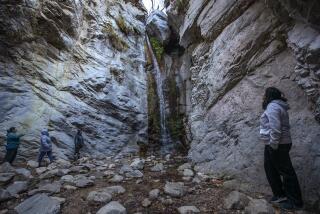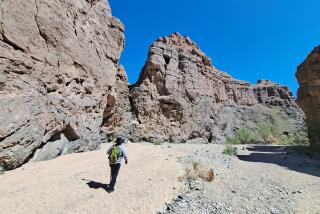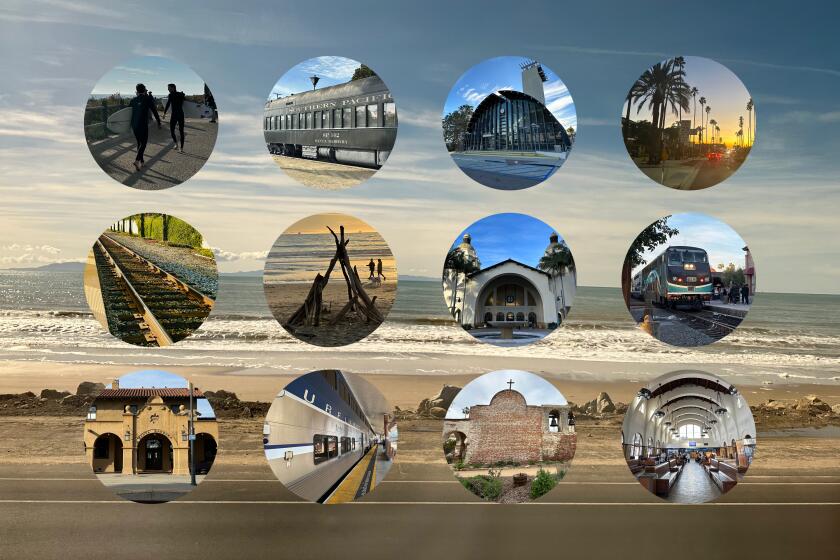Four Western States Share New Monument
The only place in the United States where a person can stand in four states at one time, Four Corners Monument--at the intersection of Arizona, Colorado, New Mexico and Utah--was rededicated last week after a major renovation. The new monument, which is being funded by the Department of Interior’s Bureau of Land Management, is a granite open-air structure surrounded by benches and a few booths selling traditional Navajo foods, jewelry and crafts. A stone slab in the center marks the place where the four states meet, and the new structure includes improved handicapped access. It replaces a 30-year-old concrete slab marker put down in 1962 when U.S. 160 was constructed within a quarter-mile of the site and tourists started dropping by en route to vacations at the Grand Canyon, Lake Powell and in southern Colorado. Although never a primary tourist destination, Four Corners is visited by thousands each year. It is on the 16-million-acre Navajo reservation, 40 miles southwest of Cortez, Colo., and managed by the Navajo Nations Parks & Recreation Department. There is a $1 per car admission charge.
Travel Quiz: Who takes the most driving trips--Americans, Germans, the French, English or Danes?
Vegas-L.A. Traffic Update: In an effort to alleviate Sunday traffic jams on Interstate 15 between Las Vegas and California, the Nevada Department of Transportation has amended its construction schedule on the highway--round-the-clock road work that had been channeling southbound two-lane traffic down to one. Road construction will now halt between Sunday and Monday mornings, except when construction falls behind schedule, according to a department spokesman. There is also a “constantly updated” traffic hot line that motorists can call for a recorded message on road conditions and to find out whether construction has been halted on a particular Sunday: (702) 486-3116.
Health Fax, Not Fiction: By January, the Atlanta-based national Centers for Disease Control will launch an automated fax service to provide prospective travelers with information on health hazards abroad, according to a CDC spokeswoman. The service is an enhancement of an existing program that offers recorded information by telephone (404-639-2572) on diseases and other health risks for specific geographic areas, and tells travelers how to prevent illnesses by getting immunizations and inoculations before traveling. Produced by the CDC--the federal agency that tracks disease outbreaks around the world--the information is considered by many health and travel professionals to be the best and most up-to-date available. To access the new fax information, as well as the telephone recording, consumers can call the existing telephone number, listen to a menu of geographic areas and request the information needed and whether they want it by fax or phone, by punching in appropriate numbers. Operator assistance will be available for those with rotary-dial telephones.
Moroccan Tourist Office Closes: The Moroccan government Ministry of Tourism has closed the Moroccan Tourist Board in Beverly Hills because of underutilization, according to a spokeswoman in the Ministry’s New York office. Still open in the United States are the New York office in Manhattan and the Epcot Center office in Orlando, Fla. For travel information, contact the Moroccan National Tourist Office, 20 East 46th St., New York 10017, (212) 557-2520.
Meanwhile, Back at the Ranch: Perhaps it’s only for the rich and famous after all, but Southfork Ranch, made famous by the TV series “Dallas,” is now open to the public as a bed and breakfast for $3,500 a night. The sum covers a variety of extras: lodging for up to eight people, a personal service staff, dinner, free drinks, breakfast and complete use of the mansion and pool. There have been some takers for the $3,500-a-night lodging, which opened to the public in August. They include senators, sports figures, celebrities and foreign dignitaries, according to a ranch spokeswoman. Less expensive are the daily tours of the 41-acre property: $4 for adults; children 12 and under, $2. Reservations: (214) 442-7800.
Who’s on First? In an effort to boost travel on its international routes, Continental Airlines is becoming the first U.S. airline to eliminate first-class service on transatlantic and transpacific flights and replace it with Business First--a new service level representing a cross between business and first-class. By March, according to a Continental spokeswoman, the airline’s entire international fleet of 18 planes will be reconfigured so that seats are arranged in two classes rather than three. Coach service will remain essentially the same, but business class will have electronically controlled sleeper seats in a 2-2-2 configuration with increased room between rows, improved food service and individual six-channel video monitors. The new service class was unveiled recently on two Continental planes flying a variety of routes, including an occasional trip in and out of Los Angeles. Fares for Business First are expected to remain at current business-class price levels, according to a spokesman.
Quick Fact: Condoms are being distributed free at Bergen’s SAS Royal Hotel as part of the Norwegian city’s AIDS awareness program.
Shaping Up for Ships in Monterey: The new Maritime Museum of Monterey--designed to trace the region’s seafaring history, from the landing of Spanish explorers through the city’s reign as sardine processor to the world in the 1920s to ‘40s--will open Saturday with a parade of ships at 10:45 a.m., an amphibious landing by the Marines at noon and music in the plaza adjacent to the museum. Objects in the museum collection will range from priceless navigational instruments to ships in bottles. The museum is located in Stanton Center, Historic Custom House Plaza, near downtown Monterey and Fisherman’s Wharf. Admission: $5 for adults, $3 for children 13-18, $2 for children 6-12, children under 5 free.
Quiz Answer: Americans use motor vehicles for 82% of their trips; Germans for 48%; French, 47%; English, 45%, and Danes 42%, according to the World Resource Institute.
More to Read
Sign up for The Wild
We’ll help you find the best places to hike, bike and run, as well as the perfect silent spots for meditation and yoga.
You may occasionally receive promotional content from the Los Angeles Times.






